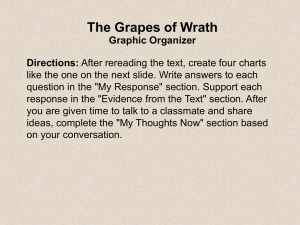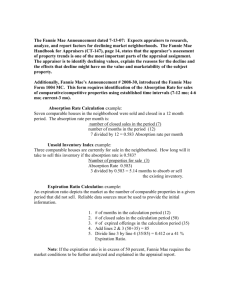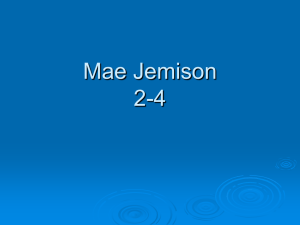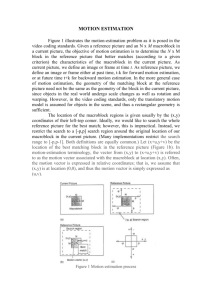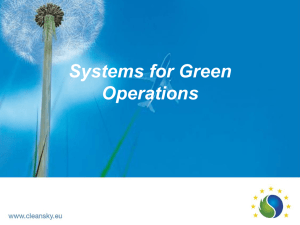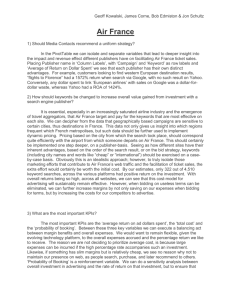UNIV Unit I Essay
advertisement
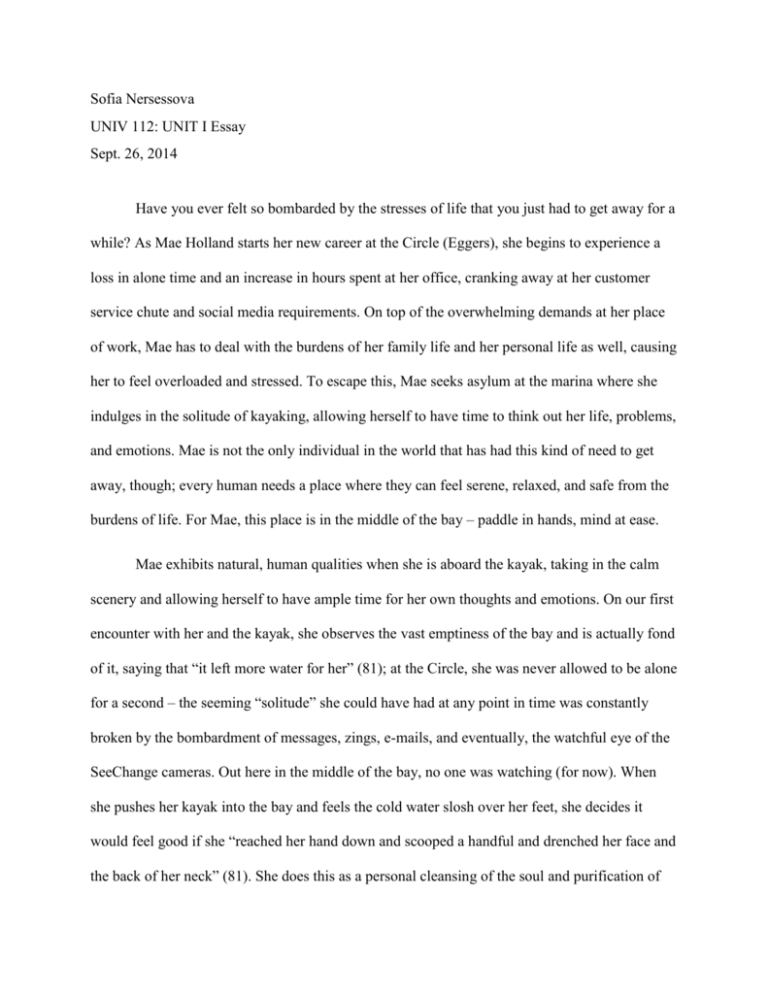
Sofia Nersessova UNIV 112: UNIT I Essay Sept. 26, 2014 Have you ever felt so bombarded by the stresses of life that you just had to get away for a while? As Mae Holland starts her new career at the Circle (Eggers), she begins to experience a loss in alone time and an increase in hours spent at her office, cranking away at her customer service chute and social media requirements. On top of the overwhelming demands at her place of work, Mae has to deal with the burdens of her family life and her personal life as well, causing her to feel overloaded and stressed. To escape this, Mae seeks asylum at the marina where she indulges in the solitude of kayaking, allowing herself to have time to think out her life, problems, and emotions. Mae is not the only individual in the world that has had this kind of need to get away, though; every human needs a place where they can feel serene, relaxed, and safe from the burdens of life. For Mae, this place is in the middle of the bay – paddle in hands, mind at ease. Mae exhibits natural, human qualities when she is aboard the kayak, taking in the calm scenery and allowing herself to have ample time for her own thoughts and emotions. On our first encounter with her and the kayak, she observes the vast emptiness of the bay and is actually fond of it, saying that “it left more water for her” (81); at the Circle, she was never allowed to be alone for a second – the seeming “solitude” she could have had at any point in time was constantly broken by the bombardment of messages, zings, e-mails, and eventually, the watchful eye of the SeeChange cameras. Out here in the middle of the bay, no one was watching (for now). When she pushes her kayak into the bay and feels the cold water slosh over her feet, she decides it would feel good if she “reached her hand down and scooped a handful and drenched her face and the back of her neck” (81). She does this as a personal cleansing of the soul and purification of the mind; she is immersing herself in the natural world, which contrasts heavily with the exigent, pressing attitude at the Circle. There is a sense of urgency at the Circle: to always be working, doing something, being somewhere, etc. While Mae is reposing in the bay, she is allowed to spend time with herself and live in the moment. She encounters a grey seal and watches from her kayak, and they “locked in mutual regard, and the moment, the way it stretched and luxuriated in itself, asked for continuation. Why move,” (81) she asks herself. There is no pressing need to be anywhere, and just sitting here and sharing this moment with a harbor seal nourishes her more than being anywhere else. Furthermore, she has a very human experience when she begins to think of all the problems in her life, especially her father’s health situation. She has ample time to get all of her thoughts aligned, thinking to herself, “[My] father was a mess. No, he wasn’t a mess,” (82) followed by “there was nothing she could do for him. No, there was too much to do for him,” (83). She has time to experience realization about her thoughts and get all of them straightened out. When she calms down and begins to rest in her kayak, she continues to see “no reason to go anywhere. Being here….was plenty,” (84); she stayed there for almost an hour, just drifting through the bay in her kayak, letting herself think and relax. As her time at the Circle goes on, she eventually has no time to relax or think for herself– she barely sleeps, staying up in an attempt to raise her PartiRank, and is constantly working on her customer service chute. Just like Mae, I have a place where I feel calm, be human, and get away from my problems. My peaceful experience involves one major similarity with Mae’s: a kayak. The James River, a beautiful stretch of more than 300 miles, runs horizontally through the mountainous, East-coast state of Virginia. Though the river is captivating from our urban setting here in Richmond, the most relaxing, crystal clear waters can be found over west in Buchanan. A month ago, my adventurous sister Karina took me down to Buchanan for a 9-mile kayaking trip, eager to have this first-time experience. As we pulled up to the river, we saw a view to die for: mountains cuddling a long stretch of river, shallow water with just enough of a current to carry us, and sunshine hidden behind the clouds – just enough to keep us warm and comfortable. After a lengthy instruction on safety, we drove down to the bank to load into our kayaks and set out into the open waters. I looked at the waters and a rush of thoughts came over me, suddenly withering away the previous effects of the once-beautiful scenery. Is this safe? Would I get stuck in the rocks? Would my kayak flip over? What if I got hurt? Despite these never-ending questions and worries, we loaded ourselves into our own bright orange, traditional kayaks. As we steadily pushed off of the bank, we were in and facing the rapids. Once we surpassed those white rushes of sloshing water against the large, rounded rocks, we rode smoothly through the soft current, pulling us slowly through the mountains and marshes and bending branches of trees. As Mae had done, I rested my paddle in my lap and laid back, beholding the scenery. With a clear mind, I wondered how this boundless river could be so uninhabited; I felt so lucky to be flowing down this river, no phone in hand and no soul knowing about what my eyes were experiencing, aside from my sister. It felt incredible having this all to myself – my own precious, selfish memory. Suddenly, my soul-filling experience was interrupted by something fierce: a pang of hunger. Half-way through our ride, we pulled our kayaks off to a sandy bank covered in rocks to eat the sandwiches we had packed. As I quickly gulfed mine down, I knelt at the riverside and watched the water slowly crawl past me. The water looked so empty and inviting, it was almost as if it was calling my name to come take a cool dip. So as to not go against nature’s wishes, I swooshed my legs through the crisp, cold water and dipped my whole body in, fully clothed in my athletic shorts and tank top. I lazily stroked back and forth through the waters, lolling my head in and feeling the coolness enter the roots of my hair, refreshing every cell of my being. Though the water of the James was mucky back in Richmond, the water here left me feeling cleansed and refreshed, so as I swam back to the bank, I wondered how the water of one river could be so different in two points. As I sat to rest, smelling the water on my skin and entangled through my hair, I pressed my hands into the ground beneath me and felt the rocks: smooth and flat for the most part, perfect for skipping across the water. I counted the bounces, trying every time to get a higher count than the last, and then realized that it had been more than 20 minutes since we paused our ride. I didn’t mind the lost time though because it was far from time wasted; I felt air-light, at peace with myself and with my surroundings, and I was in no rush to get back to our car. By the end of the 9-mile trek, every possible inch of our arms were burning sore, and though we longed to go back to the comfort of land, we didn’t want to give up the naturescape before us. Just as the sun was creeping out from behind the clouds, we had reached our starting point and were pulling our kayaks back up to shore, feeling lucky to have avoided the blazing August heat. We trudged back onto the shore, walked to my sister’s white Hyundai, and sat back in our seats, still smelling the remnants of river water in our ponytails. The day had been spent immersed in serenity, completely at peace with the world and only shared with one other soul. Mae might have been at peace in the middle of the bay, but I had been given a mountain range, a winding river, and time to realize how beautiful the world is; yet I suppose our experiences had been different in more than just that way. Though the obvious similarity between my peaceful place and Mae’s is the fact that both involved a kayak, the central and more important similarity is the feeling of being human and disconnected from technology. Mae ventures to the bay for some alone time with the wildlife and her thoughts, not to be shared with anyone else. Though I kayak with my sister, the physical presence of another human is not an implication in regards to the experience; the conversation is rather minimum between us because we both become mesmerized by the scenery, absorbing the moment. So even though we are in the same place at the same time, we are having our own individual experience. Furthermore, neither Mae nor I posted pictures of our trips on social media, “tweeted” or “zinged” about it, or discussed the experience fully with our family and friends; additionally, we restrained from calling and texting from the kayak because we wanted to be alone with ourselves, not with multiple other people through a screen. This allows me, as well as Mae, to be more in-touch with reality. The key difference, though, is the intent of the activity. While Mae escapes to the marina during times of difficulty in her life, I kayak just to relax; Mae thinks out her problems out in the bay, while I think of nothing. Unlike Mae, I do not need a stressful reason to go to the river for some downtime. Instead, I go there in hopes of some fun to be had, a view to be seen, and quality time to be spent with my sister, no matter what state of mind I am in before I get there. When she rests her paddle in her lap, Mae ponders her relationship with her parents and the problems of her past, causing her to cry, but I could not imagine being upset about a single thing while kayaking down the James; it is as if I am too busy thinking about how beautiful the world is and how lucky I am to see it to be crying about something. As you can see, both Mae and I have two distinct places we go to in order to feel at peace with ourselves and let our mind be at ease. This need to get away and “escape reality” holds true for most, if not all, human beings, because this hectic world is too much to put up with sometimes. Though both mine and Mae’s experience involved a kayak, the key difference was the intent of our escape – she went to evade her problems, and I didn’t need to be having problems at the moment in order to indulge in the activity. So, have you thought of a place where you feel calm and relaxed?

